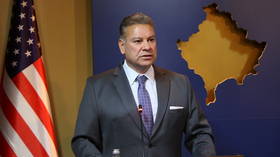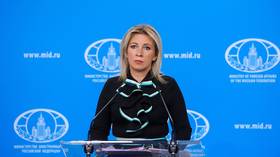US ‘categorically rejects’ provision of UN resolution on Kosovo

The US is opposed to any Serbian security forces returning to Kosovo and has given the breakaway province “firm security guarantees,” the State Department’s special envoy for the region, Gabriel Escobar, said on Tuesday.
Belgrade announced over the weekend that it will ask for the return of up to 1,000 security personnel to the province, as provided for by UN Security Council Resolution 1244. The resolution was adopted in 1999 to allow for NATO to take control of Kosovo.
“We are categorically opposed to this, we categorically reject it, we don’t support this at all,” Escobar told the US government-funded Radio Free Europe during an interview in Pristina.
“I also want to say that Kosovo has very firm security guarantees from the US,” Escobar told RFE journalist Arma Zejneli Loxha. Asked about the form of these guarantees, he said the US is participating in KFOR, the NATO-led peacekeeping mission that has approximately 3,700 troops in Kosovo.
Albin Kurti, the prime minister in Pristina, has asked KFOR to forcibly remove the roadblocks set up by local Serbs in the north of the province, but the NATO force declined. Escobar told RFE that the barricades should be removed by the people who put them up, and that they need to be given a political avenue to express their legitimate grievances.
The “most important thing” for the US is for Pristina to set up the association of Serb municipalities – one of the provisions from the 2013 Brussels Agreement that the ethnic Albanian government has so far refused to abide by. He said this was an obligation under international law that no politician or party can “simply walk away from.”
In response to the argument that this was an attempt by Serbia to subvert and partition Kosovo, Escobar disagreed. He called the municipal association an “existing obligation” that needs to be carried out “as soon as possible,” and a matter between the Pristina government and the “minority community,” entirely within the laws, institutions and structures of Kosovo.
He ended the interview by once again promising a prosperous future for the Western Balkans in the EU and the “Trans-Atlantic community.”
Responding to Escobar, Serbian PM Ana Brnabic tweeted a question to “Great Leaders” of the West. If UN resolutions and existing agreements are null and void, she wrote, “in accordance with what agreement/resolution/principle should we act? Or are we just supposed to follow your horoscope in order to guess your wishes and help save the world peace?”
Authorities in Belgrade say that Pristina’s campaign of violence and intimidation of the remaining ethnic Serbs has led the region to the brink of war. Serbia has ruled out recognition of the breakaway province’s 2008 independence claim.













